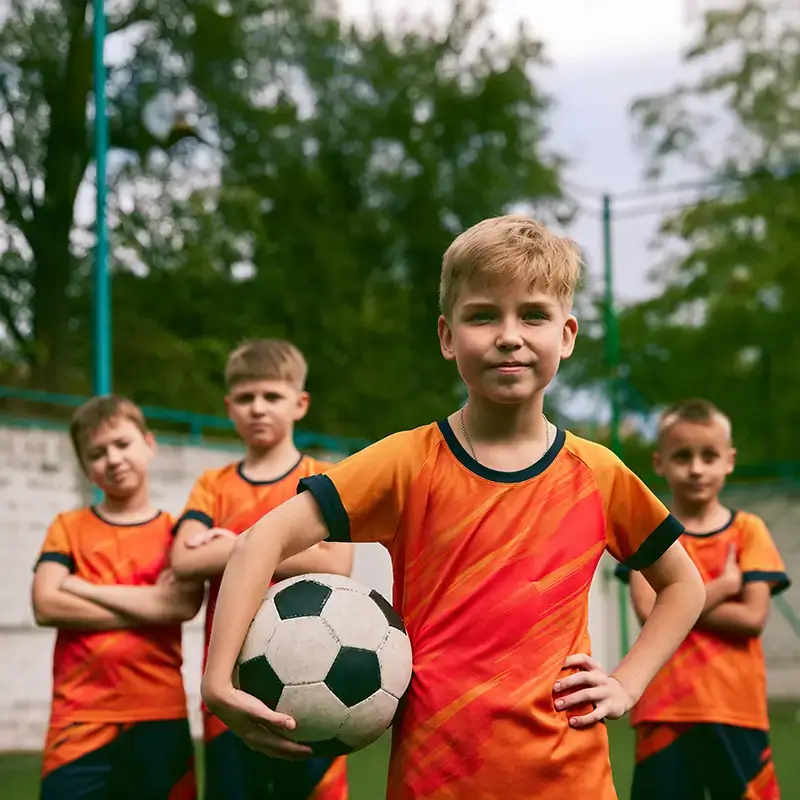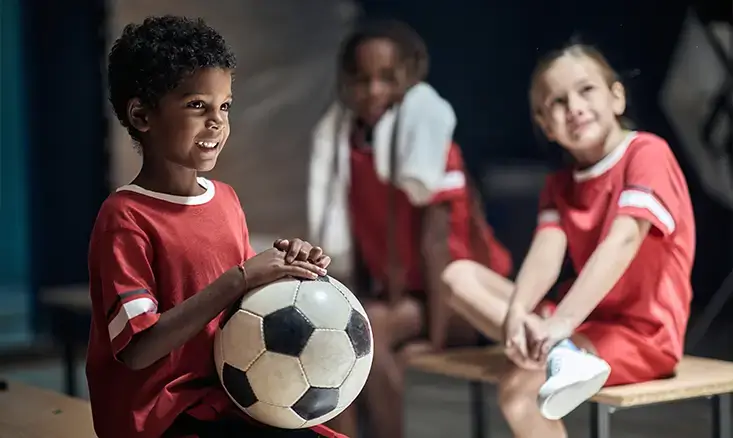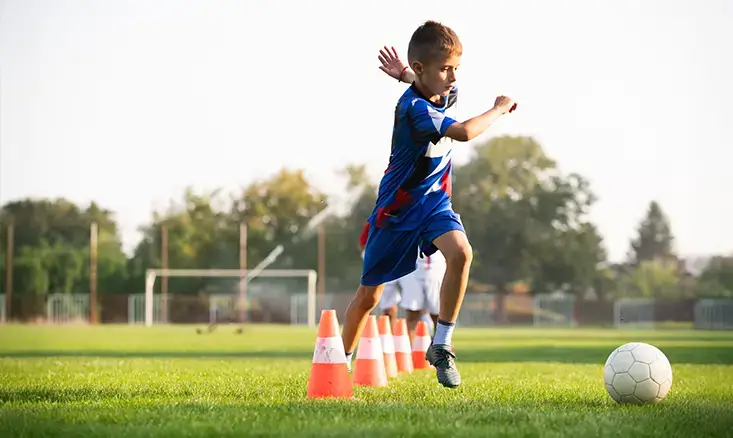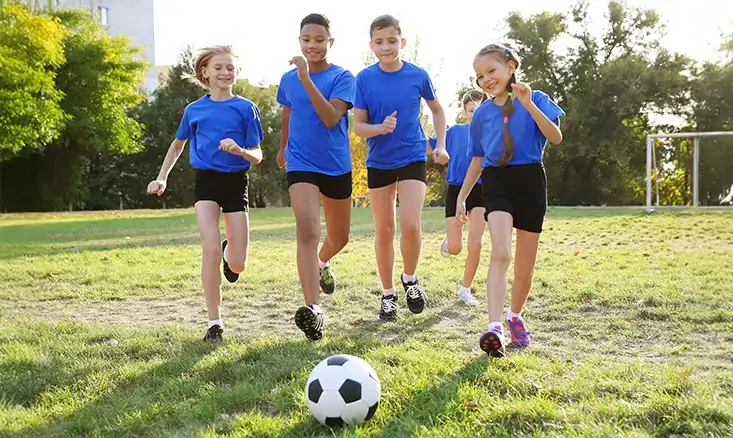7 Ways to Make New Friends at Soccer Summer Camps

CRFC BLOGS
LATEST BLOGS & NEWSLETTERS
7 Ways to Make New Friends at Soccer Summer Camps
Starting soccer camp without having any friends can feel uncomfortable. You’re surrounded by kids who might already know each other. You’re trying to learn new drills, listen to coaches, and figure out where you fit in, all at once.
At Charlotte Rise FC, summer camps are full of chances to make friends. Real friends. The kind you laugh with during breaks, high-five after a pass, and stay in touch with after camp ends.
In this guide, I’m walking you through five real ways to meet people and build friendships that last longer than one summer. No awkward tips. Just things that actually work—on and off the field.
Let’s get into it.
1. Join the Action Early
The moment you show up at camp, things start moving fast. Kids are warming up, and certified coaches are calling out drills. If you’re new, it’s easy to hang back and watch. But that’s actually the worst time to wait.
Jump in right away.
You don’t have to be the loudest or the fastest. Just get on the field, start passing the ball, or join the warm-up. When others see you participating, they’re more likely to include you. You show that you’re part of the team, even on day one.
Think of it like this: the earlier you step in, the quicker others get to know your name, your game, and your vibe. You might not talk much that first day, but you’re already breaking the ice by being there and playing.
Here’s a tip: If you see someone else standing off to the side like you are, invite them to join you. That one small move can start a friendship.
2. Ask Simple Questions
You don’t need a big speech to start a friendship. Sometimes, just asking a simple question is enough.
Try this:
- “What team do you play for?”
- “Who’s your favorite player?”
- “Do you play defense or forward?”
These are easy, no-pressure questions.
Why does this work? Because most kids want to talk. They’re just waiting for someone to go first. When you ask a question, you’re giving them a reason to talk to you. And once they answer, you’ve got a conversation going.
You can ask during water breaks, before a game starts, or even while you’re stretching. The best part? You don’t need to be best friends right away. A few back-and-forth chats each day can turn into something real by the end of the week.
And hey, don’t stress if someone doesn’t answer much. Just move on and try with someone else. Friendships aren’t forced. They’re found.

3. Use Teamwork to Your Advantage
You’re here to play soccer. And soccer is a team game. That’s actually one of the easiest ways to make friends—by working together in the field.
When you pass the ball to someone, give them a quick “Nice shot!” when they take a chance, or call out “I got you!” during a drill, you’re doing more than just playing. You’re showing that you’re a teammate. And teammates stick together.
Why does this matter? Because shared goals create quick bonds. You don’t even have to talk much. Just playing hard, showing support, and looking out for others builds trust. And trust leads to friendship.
Here’s a simple trick:
If the coach asks you to pick a partner for a drill, don’t just go to someone you know or follow the crowd. Look for someone new. Maybe someone is standing alone. Be the person who makes the first move.
If you help someone during practice, they’ll remember that. And the next time teams are picked? They’ll probably want to play with you again.
4. Join Group Hangouts or Downtime Activities
Charlotte youth soccer camps aren’t all drills and matches. There’s a lot of time between lunch breaks, water breaks, warm-ups, and cooldowns. And those moments? They’re gold when it comes to making friends.
When a group is hanging out, messing around with the ball, or just sitting under a tree talking, join them. You don’t need a big reason. Just walk over, listen, and add something when it feels right.
Why’s this important? Because friendships often start when you’re just being yourself, not when you’re trying too hard. Laughing about a goofy goal or joking about how hot the weather is can connect you just as fast as anything on the field.
And if there’s a casual juggling game or a mini scrimmage after camp? Say yes. Even if you’re tired or unsure, say yes. That’s where groups form. It’s where inside jokes are born.

5. Be Consistently Kind and Positive
Here’s something simple that a lot of people forget: people remember how you made them feel. And when you’re kind, others want to be around you.
That doesn’t mean being fake or always smiling. It just means showing respect, being encouraging, and treating everyone like a teammate.
- Someone misses a shot? Say, “Nice try.”
- You win a scrimmage? Say “Good game” to the other team.
- A new kid looks nervous. Say, “Hey, wanna pass with me?”
These moments seem small, but they add up. When you’re positive every day, not just when you’re winning or feeling great, people notice. They trust you more. And trust builds friendships.
Kindness isn’t just being nice—it’s being consistent. That’s what makes others feel safe around you. And in a camp full of new faces, feeling safe with someone opens the door to a real connection.
So, if you’re wondering how to stand out in a crowd? Don’t worry about your skills. Just be the person who lifts others up.
6. Get Help from Coaches or Counselors
Making friends doesn’t mean you have to figure it out all on your own. Coaches and camp staff are there to help with more than just soccer—they’re also great at helping kids connect.
Let’s say you’re struggling to find a group or feeling left out. Tell a coach. Seriously. They’ve seen it before, and they’ll know what to do. Maybe they’ll switch up teams for a game, pair you with someone during drills, or set up a group activity where no one gets left out.
You don’t have to say a lot—just something like, “Hey Coach, can you help me get in with a group?” That’s it. They’ll take it from there.
Also, keep an eye out for icebreaker games or team-building challenges. Some camps use those right away to get kids talking and laughing. Don’t skip them, even if they seem cheesy at first. That’s often where the first laughs—and first friendships—happen.
And remember, counselors notice the quiet kids. If you want help, speak up. They’re literally there to make camp better for you.

7. Stay Connected After Camp
Just because camp ends doesn’t mean the friendships have to.
If you meet someone you really click with—maybe you played on the same team all week or always sat together at lunch—don’t let that connection fade. Stay in touch.
Before the last day, ask if they want to exchange contact info. That could be a phone number (if you’re old enough), a parent’s email, or even just a first name and city so you can find them on social media later (with your parents’ help, of course).
You can also:
- Set up a friendly scrimmage at a park.
- Invite them to another Charlotte Rise FC camp.
- Keep messaging and cheering each other on during the soccer season.
Why this matters: Friendships take time. One great week is a strong start, but keeping in touch builds something stronger. And who knows? That camp buddy could turn into a teammate, a training partner, or even a lifelong friend.
Conclusion
Making new friends at a soccer summer camp isn’t about being the loudest or the best player. It’s about showing up, being kind, joining in, and putting yourself out there—even just a little.
Every pass, every smile, every “Hey, wanna warm up together?” is a chance to connect. You don’t have to be perfect. You just have to be present.
At Charlotte Rise FC, summer camps are more than drills and goals. They’re about the people standing next to you on the field, laughing during water breaks, and cheering you on after a good play.
So the next time you step onto that field, remember—you’ve already got something in common with everyone around you: you all came to play, to learn, and maybe even to make a friend or two.
Which of these steps will you try first? Go ahead—pick one and see where it leads.
FAQs
What if my child is shy and has trouble starting conversations?
That’s totally okay—and more common than you think. Many kids feel nervous at first. Encourage your child to start small by asking simple questions like “What position do you play?” or “Do you want to pass with me?” Coaches at Charlotte Rise FC are also trained to help campers connect by pairing them in activities and encouraging group interaction.
How does CRFC create a friendly environment for new campers?
Charlotte Rise FC designs each camp with teamwork and community in mind. On day one, coaches run icebreaker games and small-group drills to help kids feel comfortable. Campers are rotated during sessions so they meet new teammates often, and no one is left out. We ensure every child feels like part of the team—because they are.
Can kids choose who they team up with during drills or games?
Sometimes, yes. But we also switch things up on purpose. Letting kids choose partners is great when friendships are forming, but coaches will often assign groups to make sure everyone gets a chance to meet someone new. It’s one of the easiest ways to break cliques and help friendships grow across the field.
Will my child be able to stay in touch with friends after camp?
Absolutely. If they feel comfortable, we encourage families to exchange contact information before the last day. Some campers even meet again through Charlotte Rise FC’s other programs like Rising Stars, team tryouts, or weekend scrimmages. Building connections at camp can lead to long-term friendships on and off the field.
What should my child do if they feel left out during camp?
If your child ever feels left out, they should tell a coach or camp staff member right away. Coaches are there to help—not just with soccer, but with the whole camp experience. They can include your child in a group, change up pairings, or guide them through an activity that helps them meet others. We take inclusion seriously, and no camper should ever feel alone.

Did you find this useful?


